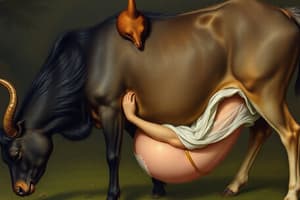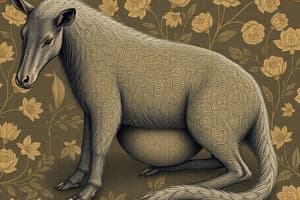Podcast
Questions and Answers
During sexual reproduction in animals, what is the main genetic material exchanged between the male and female parents?
During sexual reproduction in animals, what is the main genetic material exchanged between the male and female parents?
Which of the following animals is an example of an organism that reproduces asexually?
Which of the following animals is an example of an organism that reproduces asexually?
What term is used to describe the time between conception and birth in animals?
What term is used to describe the time between conception and birth in animals?
Which of the following is NOT a component of the reproductive system in animals?
Which of the following is NOT a component of the reproductive system in animals?
Signup and view all the answers
What major event occurs during puberty in animals?
What major event occurs during puberty in animals?
Signup and view all the answers
What biological process involves shedding of the uterine lining in female mammals?
What biological process involves shedding of the uterine lining in female mammals?
Signup and view all the answers
What is a key difference between the gestation period of mammals and reptiles?
What is a key difference between the gestation period of mammals and reptiles?
Signup and view all the answers
Which of the following can influence the onset of puberty in mammals?
Which of the following can influence the onset of puberty in mammals?
Signup and view all the answers
What is the primary role of the uterus in the female reproductive system?
What is the primary role of the uterus in the female reproductive system?
Signup and view all the answers
Which organ in the male reproductive system is responsible for producing sperm?
Which organ in the male reproductive system is responsible for producing sperm?
Signup and view all the answers
What is the role of hormones in the reproductive system?
What is the role of hormones in the reproductive system?
Signup and view all the answers
During which phase of the menstrual cycle does ovulation occur?
During which phase of the menstrual cycle does ovulation occur?
Signup and view all the answers
Study Notes
Reproduction in Animals and Reaching Adolescence
Reproduction is an essential process that occurs in all living organisms, including animals. It involves the production of offspring, which ensures the continuity of species. There are various forms of reproduction, each with its unique characteristics and requirements. In this article, we will explore the different methods of reproduction, the gestation period, changes during puberty, and key components of the reproductive system.
Types of Reproduction
Animals reproduce through two main processes: sexual reproduction and asexual reproduction.
-
Sexual Reproduction
Sexual reproduction involves the fusion of gametes - sperm from male parents and ova from female parents. This process results in the creation of a zygote, which develops into a new individual possessing traits from both parents. Examples of sexually reproducing animals include mammals, birds, and insects.
-
Asexual Reproduction
Asexual reproduction does not involve the union of gametes. Instead, a single parent produces offspring without any genetic material contribution from another individual. This method generally leads to offspring that are genetically identical to their parent. Some examples of asexually reproducing animals include starfish, sponges, and planarians.
Gestation Period
The gestation period refers to the time between conception and birth. This varies significantly among different animal species. For instance:
-
Mammals typically have a prolonged gestation period ranging from several weeks to over two years. Examples include humans with a gestation period of around 9 months, primates like gorillas with gestations lasting up to eight months, and marsupials such as kangaroos with gestation periods lasting only three to four days.
-
Reptiles, including snakes, lizards, and crocodiles, have relatively shorter gestation periods, usually measured in weeks rather than months.
Puberty Changes
Reaching adolescence marks the beginning of maturity and reproductive capability in many animal species. Puberty changes can vary depending on the animal's physiology and environment. For example:
-
In some mammals, the onset of puberty is influenced by factors such as body size, nutrition, and social interactions within their group.
-
In many bird species, the onset of puberty is triggered by environmental factors, such as the length of daylight experienced during the breeding season.
Reproductive System
The reproductive system is a complex network of organs and hormones that work together to facilitate reproduction. Some key components include:
Female Reproductive System
-
Ovaries: Ovaries are responsible for producing and releasing ova, which are then fertilized by sperm in the female's body.
-
Uterus: The uterus is an essential organ for nurturing the developing fetus during pregnancy.
Male Reproductive System
-
Testes: Testes produce sperm and the male hormone testosterone.
-
Prostate gland: The prostate gland contributes to the production of seminal fluid, which provides nutrients and protects sperm during mating.
Hormonal System
- Hormones: Hormones play a crucial role in regulating the reproductive system, including the development of secondary sex characteristics and the menstrual cycle in females.
Menstrual Cycle
The menstrual cycle is a series of hormone-driven events that occur in females, culminating in the shedding of the endometrial lining if fertilization does not occur. Key stages of the menstrual cycle include:
-
Follicular Phase: During this phase, the ovaries release a mature follicle containing an ovum.
-
Ovulation: Ovulation is the process of releasing the ovum from the follicle, which can then be fertilized by sperm.
-
Luteal Phase: After ovulation, the follicle transforms into the corpus luteum, releasing progesterone and estrogen to prepare the endometrium for potential fertilization.
In conclusion, reproduction in animals encompasses various methods, including sexual and asexual reproduction. The gestation period varies among species, while puberty changes can be influenced by environmental factors. Understanding these aspects provides valuable insights into the complexities of animal life cycles and reproductive processes.
Studying That Suits You
Use AI to generate personalized quizzes and flashcards to suit your learning preferences.
Description
Explore the diverse methods of reproduction in animals, ranging from sexual to asexual reproduction, gestation periods across different species, puberty changes, and key components of the reproductive system. Dive into topics like the menstrual cycle and hormonal influences on the reproductive system.




